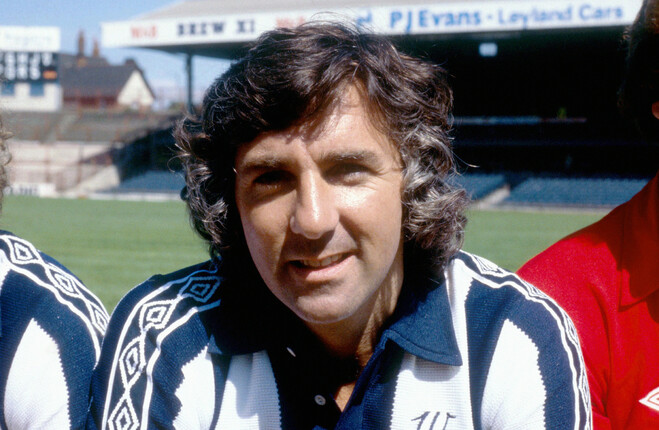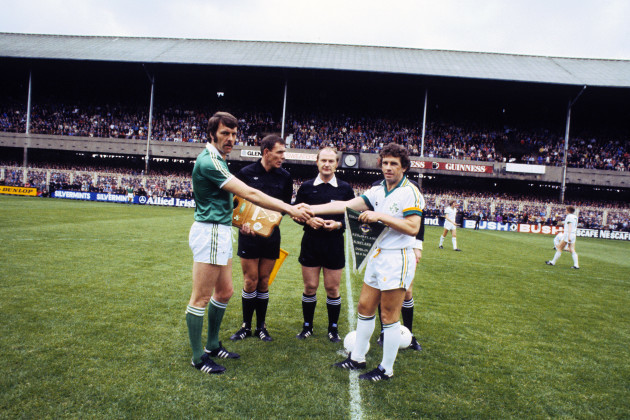Updated at 12.40
AFTER YEARS of neglect and a system that wasn’t working, a bold new era for Irish football began.
Yet instead of the instantaneous improvement that many people expected, results only worsened.
The year was 1969 when Ireland decided to dispense with the widely reviled FAI selection committee.
While Irish legends Noel Cantwell and Charlie Hurley had been the joint managers up to that point, the selection committee had complete control over which players were picked.
A young Paddy Mulligan was emerging at that time. The then-Shamrock Rovers defender was initially called up to the squad in 1966 but didn’t make his debut until 1969.
“John Giles and Frank O’Neill were part of a group of players that went to meet the FAI about appointing a manager and Mick Meagan was the first [who had full control],” Mulligan tells The42.
“[The selection committee] didn’t know who to pick and how to pick them. They could pick six defenders and four forwards, though they knew they had to pick a goalkeeper. That was the easiest choice. I was flabbergasted by some of their decisions. It was crazy stuff.”
The 2-1 loss to Czechoslovakia on Mulligan’s debut was the fifth game in what turned out to be a 21-match winless run (including unofficial fixtures).
The current Ireland side could end a wait of over two years for a competitive win if they beat Azerbaijan this evening — the last time they picked up three points was a 2-0 home victory over Gibraltar in June 2019.
Yet the bad run pales in comparison to the side of the aforementioned generation who went over four years without a win of any kind. After beating Czechoslovakia in November 1967, they finally tasted victory against a West German Olympic XI in January 1972, or if you’re only counting official matches, they broke their duck in the next game, a 2-1 win away to Iran in the Brazil Independence Cup in June of the same year.
This awful run included the entire span of Mick Meagan’s time in charge.
The former Everton and Huddersfield player managed Ireland on 13 occasions, drawing four and losing nine of those fixtures.
It got worse before it got better. Meagan’s successor Liam Tuohy’s first match in charge was a humiliating 6-0 defeat away to Austria after he was forced to pick a team that comprised almost entirely of League of Ireland players.
“I was the only English-based player playing because it was played on a Sunday,” Mulligan recalls. “Everybody had been playing on the Saturday.
“I’d been out injured at Chelsea and was recovering from an ankle injury. I trained that week and I pleaded with [the manager] Dave Sexton to let me go and play in the Irish team as opposed to playing in the reserves, making my comeback. We got hammered 6-0 and that was a chastening experience, definitely the low point.”
Mulligan puts the awful run down to a mixture of a lack of confidence brought on by so many defeats as well as some bad luck, shenanigans behind the scenes and a lack of depth within the squad.
“The unfortunate thing about the Irish team into the early ’70s is that we never had enough quality players. Invariably, your better players get injured when we were playing games. We could not afford to be without the likes of John Giles or Terry Conroy.
“Mick Meagan was the manager in ’69. Mick lost the position and he was a smashing man to play under. He was a wonderful player with Everton and a wonderful manager also.
“We played Russia in Moscow in ’73. It was 0-0 at half-time — John Giles and Terry Conroy went off injured and we got beaten 1-0. Things like that were happening. We just didn’t have enough quality to be able to suffer the losses of two smashing players.”
The chaotic scheduling also didn’t help matters.
“We would play on a Saturday and then be expected to be in Dublin that Saturday night and play an international match on the Sunday. So the whole thing was very higgledy-piggledy in those days. Invariably lads could get a knock and if they got a knock, well then they’re out.”
On the subject of another bad memory, he recalls: “In 1970, we played Poland on the Wednesday in Poznan. On the Thursday, we went by train to West Berlin. At each station, a carriage was being taken away. We ended up in the post carriage. We were an international team sitting on our suitcases preparing for a game two days later against West Germany, who’d been to the World Cup final in 1966 and they were a powerhouse in international football. That was how shambolic the FAI were.”
Yet modern Ireland fans and Kenny supporters can take some comfort from the fact that the hapless Irish team of that era did eventually come good.
After a torrid few years, they recovered to a degree with Liam Tuohy in charge, though it was under John Giles that they became a truly competitive force on the international stage.
Mulligan was part of a squad that narrowly missed out on qualification for the 1978 World Cup, while they endured similar heartache four years later with Eoin Hand as manager when the team were notoriously undermined by some highly dubious officiating at pivotal moments.
Mulligan, whose retirement coincided with the start of the Hand era, credits the emergence of several talented young players, including Liam Brady, Gerry Daly, David O’Leary, Frank Stapleton and Mick Martin as being key to reversing the squad’s fortunes, while getting increased preparation time in between matches was also beneficial.
Of his best days, he recalls: “I had a few great memories. Brazil in the Maracana in ’74 and beating a wonderful French team in both ’72 and ’77.
“Especially ’77 because Michel Platini was in his prime and there was Didier Six, Dominique Rocheteau, they had a magnificent team.
“We beat the Russians in ’74 3-0, beat Turkey 4-0 in Dalymount in ’75, so there’s a host of good memories.
“The French were voted the most attractive footballing team at the World Cup in 1978. So for us to beat them twice [was incredible]. I know ’72 was six years beforehand, but it was the nucleus of that French team from ’76 onwards to 77. All those great players that I’ve mentioned were playing and they were a magnificent team.
“But the real point is that when we did get a few extra players to supplement the better players you had, well then you were in business. You had three or four wonderful players, and the seven players who will produce for you at any given moment, and that’s what you need in international football.”
Mulligan may have retired from playing as the Giles era was ending, but he could so easily have continued his involvement as Ireland manager.
“John suggested I should apply and I wouldn’t have applied if he didn’t suggest it to me. I said: ‘Do you think I’m capable of doing this job?’ He said: ‘Of course you are.’ So I went for the interview, Eoin Hand was involved and Liam Tuohy came back in.
“I did not like going against Liam Tuohy because I respected him so much. I was on the verge of pulling out altogether because I didn’t want to be going for an Irish job with Liam. But other people wanted me to go for it and I said ‘I probably won’t get it anyway,’ so I’ll go and it won’t do anybody any harm.
“Eoin got it and deservedly so. He beat me by two votes, I think it was 9-7. I rang Eoin then afterwards and wished him all the best. And Eoin and I are still great pals.”
Who knows whether the direction of Irish football would have been radically altered had it been Mulligan rather than Hand who took charge — not that the former feels in any way unlucky when he looks back on his career in the game.
“I retired [from playing] in 1980. I felt the body wasn’t quite right and I’d gotten away with murder in my career with certainly one injury I had.
“I should not have had the career with the injury that I had. When I joined Chelsea and I was doing the medical, I was sure that I was going to fail it.
“I got my kneecap scraped in 1967. After coming back from a tour of America with Shamrock Rovers, I was given two years to play, so I was way in bonus territory. Luckily enough I continued but according to the surgeon, I should have been finished playing in 1969 [the year Mulligan made his Ireland debut].”


